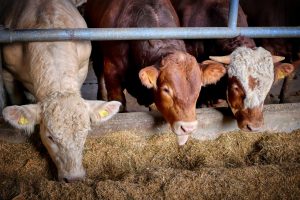Fernando Diaz
Methionine is one of the most limiting amino acids in lactating dairy cow diets. Methionine hydroxy analogues as 2-hydroxy-4-(methylthio)butanoate are synthetic amino acids in which the amino group has been replaced with a hydroxyl group in order to protect methionine from ruminal degradation. They are normally fed to improve milk and milk protein production of dairy cows. In addition, a recent meta-analysis concluded that supplementation of methionine hydroxy analogues can increase milk fat yield.
In the current dairy market, this parameter is economically important to dairy producers. Many dairy farms experience milk fat depression, which is a syndrome characterized by a reduction in milk fat content. The biohydrogenation theory suggests that this problem is the result of a direct inhibition of fat synthesis in the mammary gland by fatty acid intermediates produced during rumen biohydrogenation of polyunsaturated fatty acids when cows receive diets with high concentration of unsaturated fatty acid and low level of effective fiber.
A recent experiment (Baldin et al., 2019) conducted at the Pennsylvania State University, Dairy Production Research and Teaching Center, evaluated the effect of a methionine hydroxy analog supplementation on milk fat synthesis in cows fed diets with increased risk of inducing milk fat depression. Thirty-six Holstein dairy cows (109 days in milk) were divided into two groups and fed corn silage-based diets with or without the analog addition at 0.1% of diet dry matter (DM) intake.
The experiment included 2 periods with different level of risk for inducing milk fat depression. First, during 3 weeks, cows were fed a diet with low-risk to produce this problem, and then, during 1 week, cows received a diet formulated to have a high risk. The researchers increased the risk for inducing milk fat depression by reducing fiber (NDF; from 31.6 to 28.7% DM) and increasing unsaturated fatty acid (from 2.57 to 3.48% DM) and starch content (from 21.8 to 28.1% DM).
The main findings are summarized as follows:
- Supplying of the analog did not affect DM intake (30.1 and 30.5 kg/day during the low- and high-risk period) and milk production (37.3 and 38.9 kg/day).
- Surprisingly, the analog did not improve milk protein synthesis. On average, milk protein content and milk protein yield were 3.25% and 1.20 kg/day during the low- and 3.27% and 1.2 kg/day on the high-risk period, respectively.
- The authors reported a significant effect on fat synthesis. Supplementing the analog during the low-risk phase did not altered milk fat concentration (3.93%) and yield (1.43 kg/day). However, feeding the analog affected milk fat production during the high-risk period. Compared with unsupplemented cows, cows fed the analog produced milk with greater fat concentration (3.86 vs. 3.61%). Thus, milk fat yield was 118 g/day higher in supplemented cows during this period.
- Interestingly, the analog decreased milk fat trans-10 C18:1 during the high-risk period, which suggests that the analog plays a key role in stabilizing rumen fermentation and preventing the shift in the ruminal biohydrogenation pathway that decreases milk fat synthesis.
In conclusion, this study indicates that supplementation of methionine hydroxy analogues could be an effective tool to increase milk fat production on dairy farms with high-risk of milk fat depression.
References
Baldin, M., Tucker, H.A. and Harvatine, K.J. 2019. Milk fat response and milk fat and urine biomarkers of microbial nitrogen flow during supplementation with 2-hydroxy-4-(methylthio) butanoate. J. Dairy Sci. 102: 6157-6166.
Zanton, G.I., Bowman, G., Vazquez-Anon, M. and Rode, I. 2014. Meta-analysis lactation performance in dairy cows receiving supplemental dietary methionine sources or post ruminal infusion of methionine. J. Dairy Sci. 97:7085-7101.
© 2019 Dairy Knowledge Center, LLC. All Rights Reserved.









